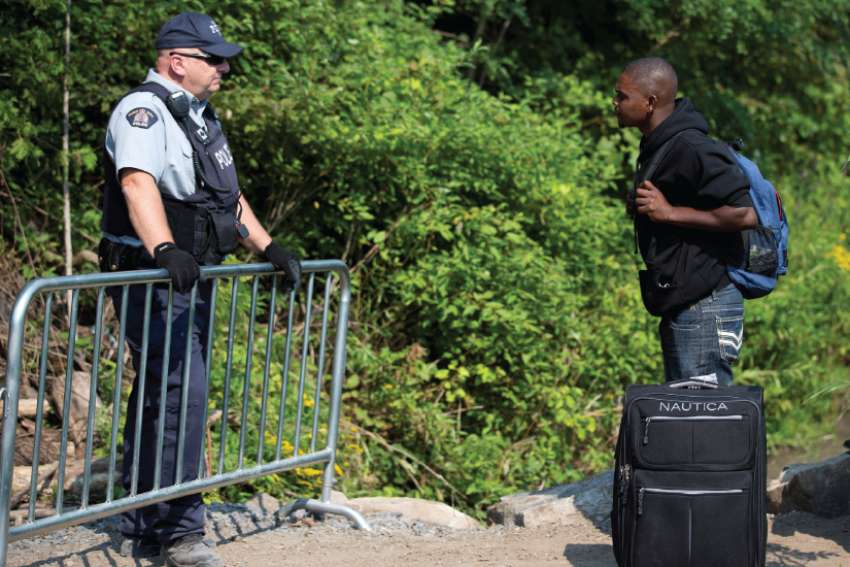In Quebec, Parti Quebecois leader Jean-Francois Lisee has called for a fence along Quebec’s unguarded border with the United States. Media from the BBC to Vice have featured eye-popping headlines about Canada building a refugee camp near the unofficial border crossing along Roxham Road in Hemmingford, Que. The opposition Conservatives and daily newspaper columnists have begun calling the latest influx a “refugee crisis.”
“It’s important to put things in perspective,” Canadian Council for Refugees executive director Janet Dench told The Catholic Register. “For Canada to be taking 50,000 (refugees per year) is really a very, very small number. You look at other countries. The numbers of people fleeing Burma-Myanmar into Bangladesh — in a single day you may have as many as Canada receives in months. Obviously, Canada is one of the wealthiest countries. We have a lot of space. We have obviously a lot of capacity…. If you turn it into a crisis, generally speaking it’s because people want to score political points.”
If there’s anyone trying to prevent politicians from scoring those points, it’s Pope Francis, whose 2018 World Day of Peace message said politicians who promote “fear of migrants instead of building peace are sowing violence, racial discrimination and xenophobia.”
Globally, there are more people on the move — displaced and desperate, refugees, migrants, stateless and homeless — than at any time in human history. The United Nations High Commissioner for Refugees counts more than 66 million people of concern, including 22.5 million verifiable refugees. Canada’s share of this global crisis is minuscule, even if we took in a record 46,700 refugees in 2016.
Conservative immigration critic Michelle Rempel believes Canada is on the edge of immigration chaos.
“(Prime Minister) Justin Trudeau has failed to manage Canada’s immigration system in an orderly, planned and safe manner,” she said in a May 4 release. “As a result, several provinces are asking for federal assistance. Conservatives will continue to call on the Trudeau government to stop wasting time, get serious and close the loophole in the Safe Third Country Agreement.”
The Canadian Council of Churches, Amnesty International-Canada and the Canadian Council for Refugees are currently challenging the constitutionality of the agreement which turns asylum seekers back to the U.S. at official ports of entry. The agreement does not cover people who enter Canada through other routes and have the legal right to make a refugee claim once inside the country.
While the Conservatives want the agreement made tougher by allowing Canadian officials to send back refugee-claimants who cross the border illegally, the churches and refugee advocates say the border-hopping problem could be cured by scrapping the Safe Third Country Agreement entirely. This would allow people coming from the U.S. to make their refugee claims at official ports of entry.
“The U.S. is not safe for all refugees,” said Dench. “From a practical perspective, if they suspend the agreement, claimants would be able to make a claim at any port of entry. They would not have to be traipsing through Roxham Road.”
The churches and NGOs expect to be in front of a judge arguing against the Safe Third Country agreement early next year.
In 2017, the RCMP intercepted 20,593 people crossing between ports, with 18,836 of these occurring near Roxham Road in Quebec. This geographical imbalance would cure itself if people claiming refugee status felt safe to do so at any regular border crossing, she said.
Refugees turned back at Canada’s border must be scheduled for an eligibility hearing in the U.S. and most often end up in overcrowded refugee detention centres. As prospective refugees filter out of Quebec, they’re filling up the shelter system in Toronto.
“No, it’s not a crisis. But it is overwhelming all the city and civil society services,” FCJ Refugee Services co-director Francisco Rico told The Catholic Register. FCJ stands for Faithful Companions of Jesus, the religious order which sponsors the centre.
It takes an average of 18 months for a refugee claimant to get a hearing in front of the Immigration and Refugee Board. The City of Toronto is putting refugees up in hotels and agencies that serve refugees are finding it hard to find permanent housing for their clients.
“It is clear that the resources approved are not enough,” said Rico.
As of May 1, the IRB had the money to hire more people to process the extra cases, but the IRB’s deputy chair of the Refugee Protection Division, Shereen Benzvy Miller, has warned that recruiting and training will take time.
“Every time the numbers go up, Canada is extraordinarily slow in getting more decision-makers,” said Dench. “There’s no particular reason that because you have more claimants that the processing time needs to be longer…. You need to match the capacity to the numbers that you have.”
Canadian Church, refugee advocates fight to scrap Safe Third Country Agreement
By Michael Swan, The Catholic RegisterFor the first time, Canada is seeing more people claim refugee status after hopping the U.S. border on back roads than make a claim at regular, official ports of entry. At the same time the total number of refugee claims has more than doubled in just one year.
Please support The Catholic Register
Unlike many media companies, The Catholic Register has never charged readers for access to the news and information on our website. We want to keep our award-winning journalism as widely available as possible. But we need your help.
For more than 125 years, The Register has been a trusted source of faith-based journalism. By making even a small donation you help ensure our future as an important voice in the Catholic Church. If you support the mission of Catholic journalism, please donate today. Thank you.
DONATE

